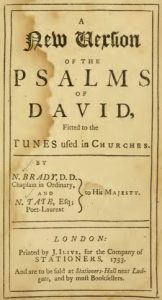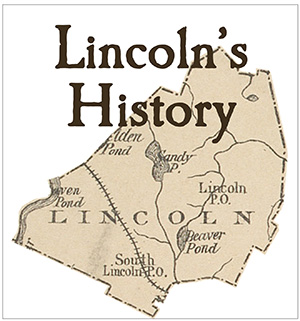By Donald Hafner
When Lincoln formed its first church in 1746, the hymn singing at Sunday services must have been dreadful.
One of the deacons would stand before the congregation and read a line or two of the psalm that had been selected for the day. The parishioners would sing the one or two lines and then stop. The deacon would read the next lines, and the congregation would again sing those and stop. There were only a few hymn melodies used at the time, and they were not attached to specific psalms. The deacon might propose his favorite melody, but since few parishioners did any singing at all, except at church, we can imagine the “tune” sung by many of them was an off-key warble or a droning monotone.
 In May 1770, some parishioners had a better idea. They proposed that rows of seats to the front of the church be reserved for “those persons who have taken pains to acquire some good degree of understanding of the rules of singing.” This was a radical proposal, because seating at the front of the church had always been assigned according to the wealth of the family, not their singing ability. Nonetheless, the proposal was adopted. The following March, town meeting approved a list of 25 men and 15 women who had proved their skill in “the rules of singing” and were granted this privileged seating. Many were from the town’s prominent families, but a few were from the poorest.
In May 1770, some parishioners had a better idea. They proposed that rows of seats to the front of the church be reserved for “those persons who have taken pains to acquire some good degree of understanding of the rules of singing.” This was a radical proposal, because seating at the front of the church had always been assigned according to the wealth of the family, not their singing ability. Nonetheless, the proposal was adopted. The following March, town meeting approved a list of 25 men and 15 women who had proved their skill in “the rules of singing” and were granted this privileged seating. Many were from the town’s prominent families, but a few were from the poorest.
This change did not sit well with some parishioners. In town meeting on May 17, 1771, a few disgruntled sorts proposed that the singers should be ousted from their seats at the front, and if they wanted to sit together, they should be sent to the back corners of the building.
The battle was joined, and there followed a rare event in Lincoln’s history. Up to this point, town meeting records were terse and bland. The town clerk wrote down each proposed warrant and whether the vote was “in the affirmative” or the negative. No record at all of the points of debate or the tally of votes, yea and nay. But not this time.
In clear handwriting, the clerk recorded: “Voted on the fourth article that it be dismissed with the contempt it deserves.” Take that, you disgruntled sorts!
For a more complete history of hymn singing in Lincoln, the Reverend Charles M. Styron’s The First Parish in Lincoln: History of the Church 1747-1942 is available in the Library.
“Lincoln’s History” is an occasional column by members of the Lincoln Historical Society.

I think the Lincoln residents of 1771 would have appreciated this creative fundraising idea that I just heard about. “Parishioners could bid to block their least favorite hymn from being sung during the coming year.” 😉
I don’t know when the choir loft in our current First Parish sanctuary was built, but I had the privilege of sitting up there (manning microphones during pandemic restrictions) as Miranda Loud conducted some beautiful voices. They may not all have been schooled in “rules of singing” but it sure sounded sweet.